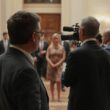Former German President Christian Wulff has publicly rebuked Chancellor Friedrich Merz’s controversial remarks regarding urban landscapes, escalating a simmering debate over immigration and integration within the country. Wulff’s criticism, delivered in an interview with the “Neue Osnabrücker Zeitung” directly challenges Merz’s recent statements connecting perceived urban problems with deportation policies, a position that has drawn widespread condemnation.
Wulff’s core argument centers on the dangers of scapegoating specific groups, specifically in the context of urban challenges. He asserted that attributing societal problems solely to migration is “false and dangerous” urging a more nuanced and evidence-based approach to addressing complex issues. He cautioned against simplistic narratives that suggest deportation alone can resolve underlying social or economic disparities.
The former president underscored the vital role immigrants play in Germany’s economic stability and future prosperity. He forcefully argued that portraying newcomers predominantly as potential strains on the criminal justice or social security systems is counterproductive and overlooks their potential contributions to German society. He specifically emphasized the importance of integrating migrants into community organizations, political parties and the broader cultural fabric of the nation, highlighting Germany’s reliance on immigration to sustain its economy.
Merz’s initial comments, made during a public appearance in Brandenburg, sparked a nationwide discussion that has sharply divided opinion. The incident culminated in a walkout by approximately 30 scholarship recipients of the Deutschlandstiftung Integration during a recent award ceremony, a gesture of protest against Merz’s stance and highlighting the sensitivity surrounding immigration policy. Wulff, as chairman of the foundation, was also present at the event, further amplifying the gravity of the situation.
While acknowledging the rising prominence of the Alternative für Deutschland (AfD), Wulff expressed skepticism regarding the prospect of the party holding the chancellorship by 2030. He conveyed confidence that Germany’s democratic forces have learned from historical mistakes and that a significant majority remains committed to preserving a democratic Germany, effectively preventing such a scenario. However, his words implicitly acknowledge the need for politicians to avoid increasingly divisive rhetoric that could inadvertently fuel the AfD’s appeal.





